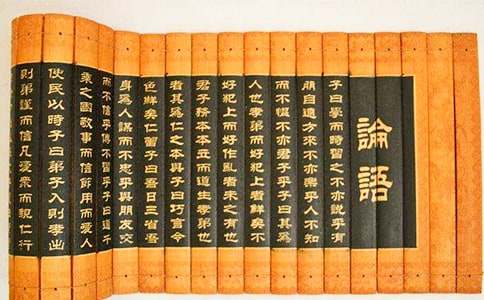- 相關推薦
《論語》中關于“君子”和“小人”的翻譯
作為中國儒家思想的經典作品,《論語》所反映的孔子的思想不僅深深融入了整個中華民族,也影響了整個世界。自十六世紀以來,眾多國內外學者都相繼推出《論語》的英譯本。由國外學者翻譯的英譯本,較為廣泛流傳的是理雅各和威利版本,國內翻譯或節譯過的學者有辜鴻銘、林語堂、丁往道等。

《論語》中“君子”和“小人”出現的頻率極高,因此準確解讀“君子”和“小人”的內在含義,對《論語》的整體翻譯尤為重要。在各種英譯本中對“君子”一詞有多種譯法,比如“the gentleman”, “the scholar”,“the good man”,“the superior man”,“intelligentle man”等,對“小人”一詞也有多種譯法,如“common people”,“the inferior man”,“the small man”,“the unworthy man”等。本文將以不同譯本為參考,探討兩個詞語在不同語境下的含義極其譯法。
例1、君子坦蕩蕩,小人長戚戚。
威利譯: The gentleman is calm and at ease; the Small Man is fretful and ill at ease.
丁往道譯: The gentleman is open and at ease; the small man is full of worries and anxieties.
魯金華譯: The superior man is broad-minded and free of worries, while the inferior man is always heavy-hearted and sorrowful.
周儀譯: A man of virtue is open-minded and always at ease; a man of meanness is full of distress at all times.
解析:三位譯者的譯文句式工整,用詞簡潔。 此句表示君子心胸坦蕩,思想坦率,其面容行為自然安定舒暢。而小人欲念叢生,心事滿滿,其外貌動作就會表現得忐忑不安,心神不寧。 魯金華譯為“the superior man”和“the inferior man”強調的是君子和小人地位的差別,其他兩位譯者選用的“the gentleman”和“the small man”強調的仍是出身高貴與低賤的差異。周儀譯為“a man of virtue”和“a man of meanness”較為接近原意,此句中“君子”和“小人”的主要區別在于個人的德識修養上。
例2、子曰:“君子不重,則不威;學則不固。”
理雅各譯:The master said, “ If the scholar be not grave, he will not call forth any veneration, and his learning will not be solid.”
辜鴻銘譯:Confucius remarked, “ A wise man who is not serious will not inspire respect; what he learns will not remain permanent.”
威利譯: “If a gentleman is frivolous, he will lose the respect of his inferiors and lack firm ground upon which to build up his education.”
許淵沖譯: An intelligentle man , said the Master, should not be frivolous, or he would lack solemnity in his behavior and solidity in his learning.
解析:原文的意思是君子應以虔誠篤誠之心,嚴肅莊重之態來學習和待人。 本句中的“君子”偏重學識抱負方面 ,因此理雅各譯為“the scholar”較為準確傳達原文的意思。而辜鴻銘譯為“a wise man”范圍過于空泛。威利譯為“gentleman”在此處并不十分合適,因為“gentleman”更側重家境較好,受過良好教育,彬彬有禮的男士。而許淵沖更是別出心裁地創造了一個新詞“intelligentle man”,將“intelligent”和“gentleman”合并在一起,充分發揮了譯者的主觀能動性。
例3、子曰:“君子周而不比,小人比而不周。”
理雅各譯: The Master said, “ The superior man is catholic and no partisan. The mean man is a partisan and not catholic.”
辜鴻銘譯:Confucius remarked, “ A wise man is impartial, not neutral. A fool is neutral but not impartial.
丁往道譯:Confucius said, “ The gentleman unites and does not plot with others; the small man plots and does not unite with others.”
解析:“小人”在《論語》中主要有兩種意思,一是平民百姓,二是道德低下,見識簡陋的人。顯然,此處的小人指后者。三位譯者的對“小人”的譯法都不相同,辜鴻銘譯為 “a fool”,理雅各為“mean man”,丁往道為“small man”,相比而言后兩種譯文更貼切原文傳達的意思,表現出小人卑鄙自私,心胸狹隘的特點。另外對“周”的翻譯也不同,分別為“catholic”, “impartial”,“unite”都較好地反映了本意。不過“catholic”源于“宗教”一詞,更符合西方讀者的思維。
例4、子曰:“君子懷德,小人懷土;君子懷刑,小人懷惠。”
理雅各譯:The Master said, “ The superior man thinks of virtue; the small man thinks of comfort. The superior man thinks of the sanctions of law; the small man thinks of favors which he may receive.”
辜鴻銘譯:Confucius remarked, “ A wise man regards the moral worth of a man; a fool only his position. A wise man expects justice; a fool, only expects favours.”
丁往道譯:Confucius said, “ The gentleman bears in mind virtues; the small man his homeland. The gentleman bears in mind the law; the small man favours.”
解析:本句再次對比“君子”和“小人”不同的人生境界。君子心系天下,胸懷遠大,道德高尚。而小人思鄉戀土,計較恩惠,考慮個人生計。 但此處的“小人”雖不及君子品行高尚,但表現出來的也無功無過,只是普通百姓的想法和行為罷了 。所以,此處若還將“小人”翻譯為“a fool”,“small man”語氣不免太重了,可譯為“ordinary man”或“common people”。
譯無定法,每位譯者和讀者都有自己的理解和偏好。本文的目的只是想借名家譯文,說明“君子”和“小人”蘊含的意義是多層面的,不可一言概之。
【《論語》中“君子”和“小人”的翻譯】相關文章:
君子為何斗不過小人經典美文12-04
君子為何斗不過小人傷感美文03-10
論語中的經典句子12-07
論語中的名言警句11-25
論語十二章翻譯及賞析12-09
《論語》中的成語故事03-09
論語中的人生格言精選12-09
論語中的名言警句大全12-09
論語中唯美的句子12-09